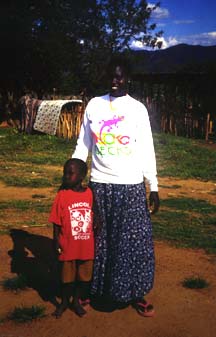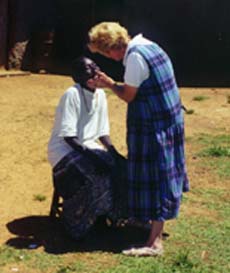|
In
1995, while the Boatmans were with Poghisio, he shared
with them the need for a school in that village. Poghisio’s
sister went to the village and began teaching the children
sitting under a tree. The school continued to grow with
some support from the Lincoln community, but there was a
need for a more formal organization and someone to
administrate it. "Our primary goal [for this trip]
was to solidify the relationship there," Dr. Boatman
stated.

[While they live in
villages with
dirt floors and small huts, the Pokot
people receive generous gifts
of clothing from the United States, including
donations from organizations in Lincoln. Notice the young
boys Lincoln Area
YMCA t-shirt]
On
O’Donohue’s first visit to Tapandany, she connected
with the people and the job at hand. Returning home, she
set to work. "Barb’s administrative skills just
kicked in," Boatman commented. She got to work filing
all the proper paper work for an organization to provide
coordination for the projects in Tapandany.
What
O’Donohue saw and felt while meeting the Pokot people
moved her heart and soul. She says, "I was struck
deep by the people." She came back focused on the
things that needed to be done. She redirected her own
life, making sacrifices that would affect her daily life.
Her priorities now included the Children of Pokot
Education, COPE. She had the upstairs of her downtown
business, General Consulting Services, remodeled so she
could live there, and she redesigned the structure of her
business so she could travel
and spend time, four to six weeks at a time, in the
village a of couple times each year.
While
looking through a few of the pictures that vividly reflect
village life, Barb comments, "Some people would look
at these people and say that they are primitive. They are
not primitive, they are a highly evolved culture."
The Pokot people, once a nomadic tribe, have become what
is termed a "marginal people." They have settled
and are no longer able to move to more bountiful areas of
land. They must make a living in a place where the land
quality is poor. Living is a challenge. "These are a
people that are at risk for extinction," Ms. O’Donohue
says. "I truly cannot imagine this earth without the
Pokot. Somehow, they add a grace and rhythm to this earth.
There would be this hollow sound or lack of sound without
them."
Droughts
continue to take a toll in this region. Several years of
drought have reduced much of the food supply. Hunger is a
daily reality. Some of the children come to school just
because they know they will get what might be their only
meal that day.
The
Pokot are a culture in which the women are the laborers.
While the men gather and discuss world issues, the women
do the work. After laboring in the fields and caring for
their families, the women will gather and not sit. They
continue to work, sometimes intricate beadwork which is
sold at market, as they discuss their families. A primary
COPE goal is to establish cottage industries to help
supplement the villager’s income.
In
terms of life and work, O’Donohue speaks of "Pokot
time." The speed with which something gets done in
Pokot is not the same as we would expect in the western
world. It is quite the opposite to "a New York
minute." Pokot-time is more like that of a rabbit
which runs, then stands stock still, and may, after some
prodding, take off running again. Though she was often
frustrated at first, O’Donohue has learned to recognize
some of the functional and cultural roadblocks the
villagers are up against.
|

"Sometimes
they run out of materials," she emphasizes, "and
so a project will just come to a standstill until I get
there and get it going again." Often it is a lack,
loss or temporary displacement of vision, which curtails a
project. "It has been an extremely valuable life
lesson for me," she says with a laugh, "learning
to live in Pokot-time."
As
an example, the recently completed block schoolhouse was
made three blocks at a time because there were just three
molds. When 1,500 of the blocks were made, the men ran out
of cement. There was a wait for funds for the remaining
1,500 blocks to be made. Though long after the scheduled
time for completion, the 3,000 blocks were assembled and
the new schoolhouse was completed. According to O’Donohue,
the villagers are now taking great pride and ownership in
it. They enthusiastically talk about coordinating green
uniforms with the green roof and ponder how to raise
school fees for study materials. "They are very proud
of their accomplishment," she adds.
Having
a school started is not enough to make a permanent
difference in the lives of the villagers, however. With
her skillful insights, O’Donohue continues to pick and
choose projects that guide the villagers into
self-sufficiency and a better quality of life. With
education and health of the children at the center of
COPE, she has taken into effect many influential factors
and implemented a number of other projects to help the
community. At present, the proposed projects include a new
school building, daily meals for the children, seeds for
crops and nutritional guidance, an irrigation system,
immunizations, basic medications, hygiene and drinking
water education, a community well which Lincoln
Rotary Club is helping with, and cottage
industries such as making ovens, bread, and jewelry to
sell at market or in nearby communities. O’Donohue also
wants to find ways to provide basic medical and dental
care.

[O'Donohue learns a few new dance steps
during a celebration]
By
taking the time to live in the village, O’Donohue has
gotten to know the needs and abilities of the people. Her
dedication has been of immeasurable value to the village,
but if you ask her, she might say she has been the greater
beneficiary. She will tell you how much she has fallen in
love with the people. She remembers each one by name,
every day, even when she is away from them.

[Daily sustenance is called "Ugi"
by the Pokot people]
Editor’s
note: When O’Donohue returns from her stint in
Africa, LDN will catch up with her to see what she did on
her recent visit with the Pokot people.

[A young woman seeks medical attention from
O'Donohue]
[Jan
Youngquist]
|
|
|
Part 1 of 3
Lincoln's
helping hands reach all the way to Africa
Barbara
O’Donohue on the way to Kenya
[MARCH
6, 2000]
What
is on your agenda for this week? If you could sneak a peek
at one Lincoln woman’s daily planner, it might look like
this: This week’s agenda: Go to a small, remote village
in Africa. Stay in "mud huts, graciously shared by
the most wonderful people you could meet."
|
|
Owner
and president of a Lincoln-based business, General
Consulting Services, Barbara O’Donohue left the States
March 5th for a return trip to Kenya. She will
be working as a volunteer for the Children of Pokot
Educational Fund (COPE), an organization she helped found.
The Pokot village she will be visiting is located in the
country of Kenya, in the Kacheliba District. This will be
one of Ms. O’Donohue’s shorter trips, taking four
weeks instead of the usual five or six. She will be
working with tribal leaders, women, educators and other
villagers.

[Barbara O'Donohue and Sam Poghisio]
How
did Ms. O’Donohue, a Lincoln businesswoman, first
connect with a village in Africa? The story begins with
Sam Poghisio, a Kenyan who attended Lincoln Christian
Seminary.
Poghisio
was an exile from Kenya when he arrived in Lincoln in the
early '90s. He came on a scholarship to Lincoln Christian
Seminary. Back in Kenya Poghisio had been a member of
Parliament. He was expelled from the Parliament during a
difficult political time. Poghisio’s strong stances had
provoked those in power, and his safety was endangered.
Shortly after Poghisio came to Lincoln, his wife, Pauline,
joined him. Mrs. Poghisio was about to give birth to the
couple’s first child and had been unable to attain a
visa. After the birth of their daughter, Chelimo, Mrs.
Poghisio was granted a visa and came to join her husband.
Poghisio
earned his master of divinity degree in 1993, and the
family returned to Kenya the following year. He took a
professorship at Africa’s largest Christian university,
Nairobi’s Daystar University. He resumed his works for
his people and was elected back into the Parliament of
Kenya in 1998.
|

Paul
and Mary Boatman of Lincoln were traveling with Poghisio
in 1995. During that visit in a remote village of the
Pokot province, the Boatmans learned of the needs of Pokot.
They observed children milling around, children who should
have been in school. There are no schools readily
accessible in the remote area around Pokot. Poghisio
explained to the Boatmans that the children of this
village grew up without education. The boys became tribal
warriors, and the girls married the boys.
Poghisio
dreamed of educating the children of Pokot, and asked his
well-educated sister if she would go there to teach. She
agreed. Poghisio’s sister opened school under a tree.
After
seeing the children and meeting the villagers during her
visit to the village, O’Donohue caught the vision. She
came home inspired by the wonderful people. With the
support of the Boatmans and other Lincolnites, she took on
the leadership to establish COPE, which has helped the
school to grow.
Later,
the class moved to a shelter, a grass hut where the
children sat on dirt floors. Since then, a new building
has been constructed, and the school children will soon
move into it. The little schoolhouse has a concrete floor,
tin roof and no desks. It is divided into five rooms.
Poghisio smiles and says proudly, "The children will
no longer have to sit in the dust."

[Poghisio poses with artifacts of his native
country]
Four
teachers and 150 children are looking forward to moving
into the new school. They now claim one of the highest
enrollments in the district, and the school is one of the
few offering a Bible-based education. Lincoln people have
joined the Boatmans and Ms. O’Donohue in supporting the
schoolhouse in Pokot.
Sam
Poghisio recently returned to Kenya after a brief visit to
the States. He was here with many other world leaders on
an invitation to the National Prayer Breakfast in
Washington, D.C. The members of the U.S. Congress hosted
the breakfast, with the President and Mrs. Clinton also in
attendance. Poghisio swung though Lincoln to see some of
his friends here and to express his great appreciation for
the people who support COPE.
[Jan
Youngquist]
(Part
2)
|
|
|
Bogus
bomb brings big response by state and local law
enforcement
[MARCH
27, 2000] At
9:43 p.m. Saturday, March 25, the Lincoln Police
Department was contacted to respond to the 300 block of
South College Street in Lincoln. When officers arrived, a
resident told them that the object had been found on the
front porch of the residence and moved to the street. The
object was suspicious in that it appeared to possibly be a
homemade bomb. Supervisors were called to the scene, and,
for the public’s safety, people within approximately 1½
blocks were evacuated. The Secretary of State’s bomb
squad was dispatched and arrived at approximately 11:25
p.m. They examined the object and determined that it
needed to be neutralized for further inspection. The bomb
squad officers neutralized the object and determined that
it had no explosives in it and it was a fake. Residents
were allowed back into their homes at approximately 1:50
a.m., and evidence was collected. This situation is
currently under investigation by the Lincoln Police
Department. The Lincoln Police Department was assisted by
the Logan County Sheriff’s Department, the city of
Lincoln Street Department and the Secretary of State bomb
squad.
[LDN]
|
|
Back
to top
|
|
Top
Stories | Sports Talk
| Weather
A
Day in the Life | Hearsay & Hairspray | Milestones
| Obituaries | Diaspora
Business
& Ag | Organizations &
Events | Good
Neighbors | Honors & Awards
| Ombudsman | Law
& Courts
The
Arts | Family Life
| Spiritual Life | Health
& Fitness | Teaching
& Learning | Book
Look | Movies &
Videos
the
em space | Where They
Stand | How We Stack Up
| By the Numbers
Letters
to Editor | About LDN
| Corrections | Happy
Ads | Classified
Ads
|



